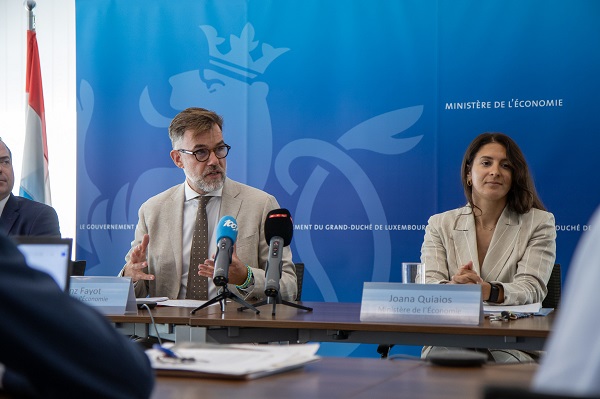 (L-R) Franz Fayot, Luxembourg's Minister of the Economy; Joana Quiaios, Ministry of the Economy;
Credit: MECO
(L-R) Franz Fayot, Luxembourg's Minister of the Economy; Joana Quiaios, Ministry of the Economy;
Credit: MECO
On Monday 11 September 2023, Luxembourg's Minister of the Economy, Franz Fayot, presented two European regulations related to digital services and how these are being implemented at national level.
In an ongoing joint effort to regulate digital services that act as intermediaries between consumers and providers, a new set of rules and obligations have been put in place by the European Union (EU): the Digital Services Act (DSA) and the Digital Market Act (DMA).
Digital Market Act
In force since October 2022, the DMA was implemented in Luxembourg law in March 2023 and aims to better regulate the commercial practices of very large digital platforms (gatekeepers) which control access to the online market; the European Commission recently published a list of such gatekeeper platforms.
Practices which are considered anti-competitive are prohibited by the DMA. For example, the platform's products cannot be listed in priority, to the detriment of a competitor's products. Platforms are also not authorised to cross-reference their data with other data from their own services and can no longer require a supplier to offer the lowest price for a product or service on their platform.
The aim, according to Luxembourg's Ministry of the Economy, is to put an end to practices which gave data economy giants such exorbitant advantages that they prevent small players from accessing the market.
The European Commission monitors the proper application of the DMA and can rely on the assistance of the Luxembourg Competition Authority at national level to carry out its control missions.
Digital Services Act
The bill for the transposition of the DSA into Luxembourg law has just been adopted by the Government Council (Cabinet). The provisions of the DSA will come into force in February 2024 for all digital platforms. Since 25 August 2023, very large online platforms must already comply with this new set of rules. The main objective of the DSA, noted the ministry, is to make the Internet safer for all, on a European scale and in a harmonised way in the 27 Member States. Thus, the DSA defines the responsibilities of platforms to prevent and, if necessary, remove as quickly as possible illegal content such as the sale of dangerous products, messages inciting hatred or the sharing of terrorist content.
Minister Fayot stressed: "The DSA is an important step in creating a safer and fairer online environment for all citizens. Europe is positioning itself as a pioneer in this context and Luxembourg supports this approach. Since digitalisation is a key element of our sustainable economic policy, it is essential that clear and uniform rules of the game apply to digital players."
The DSA applies to platforms that allow users (individuals as well as businesses) to upload their own content to the platform. This includes hosting services and online marketplaces, but also social networks. Obligations and rules are progressive and vary depending on the role of the company, its size and its impact on the online ecosystem.
Applicable measures include, for example, the obligation to give users the opportunity to report potentially illicit content. Another measure relates to transparency regarding recommendation and advertising systems, so that users understand why content is recommended to them, or to clearly indicate when content, comments or results have been commissioned by a company;
Luxembourg's Economy Ministry noted that very large platforms with more than 45 million users in Europe are the most strictly regulated. The European Commission has so far designated nineteen very large platforms (e.g. Amazon, Google Search, YouTube, X (formerly Twitter)) which, due to their great influence and use by millions of EU citizens in their daily lives, must now comply with the strictest obligations of the DSA.
The European Commission is responsible for monitoring the obligations of very large platforms, but for other platforms covered by the DSA, the country in which the platform is established is responsible for monitoring. To this end, the Luxembourg Competition Authority is designated by the bill as the Digital Services Coordinator and thus responsible for ensuring that the DSA rules are applied at national level.
An initial analysis of the platforms existing in Luxembourg and qualifying as service intermediaries covered by the DSA has estimated that there are about 240 platforms covered by the DSA in the Grand Duchy.








